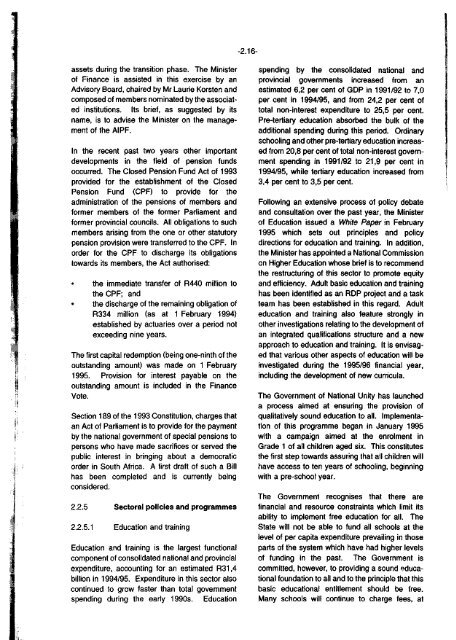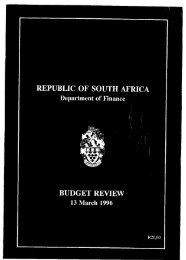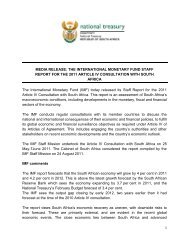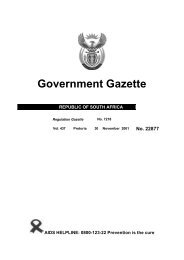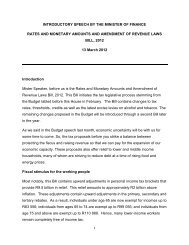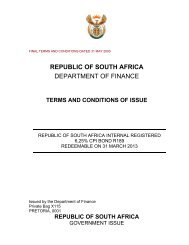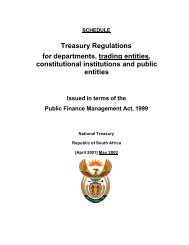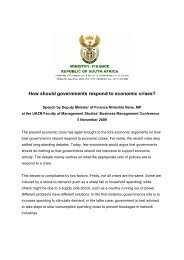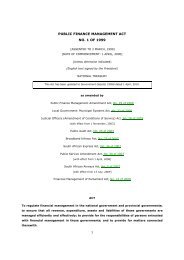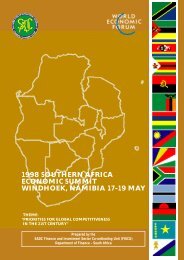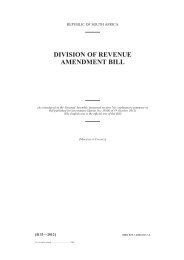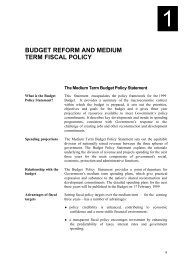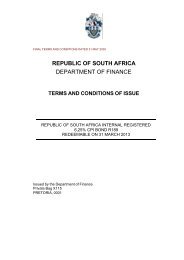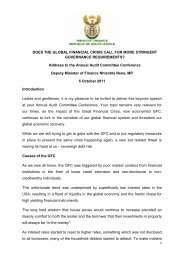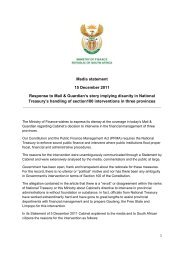1995 - National Treasury
1995 - National Treasury
1995 - National Treasury
You also want an ePaper? Increase the reach of your titles
YUMPU automatically turns print PDFs into web optimized ePapers that Google loves.
-2.16-<br />
assets during the transition phase. The Minister<br />
of Finance is assisted in this exercise by an<br />
Advisory Board, chaired by Mr Laurie Korsten and<br />
composed of members nominated by the associated<br />
institutions. Its brief, as suggested by its<br />
name, is to advise the Minister on the management<br />
of the AIPF.<br />
In the recent past two years other important<br />
developments in the field of pension funds<br />
occurred. The Closed Pension Fund Act of 1993<br />
provided for the establishment of the Closed<br />
Pension Fund (CPF) to provide for the<br />
administration of the pensions of members and<br />
former members of the former Parliament and<br />
former provincial councils. All obligations to such<br />
members arising from the one or other statutory<br />
pension provision were transferred to the CPF. In<br />
order for the CPF to discharge its obligations<br />
towards its members, the Act authorised:<br />
the immediate transfer of R440 million to<br />
the CPF; and<br />
• the discharge of the remaining obligation of<br />
R334 million (as at 1 February 1994)<br />
established by actuaries over a period not<br />
exceeding nine years.<br />
The first capital redemption (being one-ninth of the<br />
outstanding amount) was made on 1 February<br />
<strong>1995</strong>. Provision for interest payable on the<br />
outstanding amount is included in the Finance<br />
Vote.<br />
Section 189 of the 1993 Constitution, charges that<br />
an Act of Parliament is to provide for the payment<br />
by the national government of special pensions to<br />
persons who have made sacrifices or served the<br />
public interest in bringing about a democratic<br />
order in South Africa. A first draft of such a Bill<br />
has been completed and is currently being<br />
considered.<br />
2.2.5 Sectoral policies and programmes<br />
2.2.5.1 Education and training<br />
Education and training is the largest functional<br />
component of consolidated national and provincial<br />
expenditure, accounting for an estimated P.31,4<br />
billion in 1994/95. Expenditure in this sector also<br />
continued to grow faster than total government<br />
spending during the early 1990s. Education<br />
spending by the consolidated national and<br />
provincial governments increased from an<br />
estimated 6,2 per cent of GDP in 1991/92 to 7,0<br />
per cent in 1994/95, and from 24,2 per cent of<br />
total non-interest expenditure to 25,5 per cent.<br />
Pre-tertiary education absorbed the bulk of the<br />
additional spending during this period. Ordinary<br />
schooling and other pre-tertiary education increased<br />
from 20,8 per cent of total non-interest government<br />
spending in 1991/92 to 21,9 per cent in<br />
1994/95, while tertiary education increased from<br />
3,4 per cent to 3,5 per cent.<br />
Following an extensive process of policy debate<br />
and consultation over the past year, the Minister<br />
of Education issued a White Paper in February<br />
<strong>1995</strong> which sets out principles and policy<br />
directions for education and training. In addition,<br />
the Minister has appointed a <strong>National</strong> Commission<br />
on Higher Education whose brief is to recommend<br />
the restructuring of this sector to promote equity<br />
and efficiency. Adult basic education and training<br />
has been identified as an RDP project and a task<br />
team has been established in this regard. Adult<br />
education and training also feature strongly in<br />
other investigations relating to the development of<br />
an integrated qualifications structure and a new<br />
approach to education and training. It is envisaged<br />
that various other aspects of education will be<br />
investigated during the <strong>1995</strong>/96 financial year,<br />
including the development of new curricula.<br />
The Government of <strong>National</strong> Unity has launched<br />
a process aimed at ensuring the provision of<br />
qualitatively sound education to all. Implementation<br />
of this programme began in January <strong>1995</strong><br />
with a campaign aimed at the enrolment in<br />
Grade 1 of all children aged six. This constitutes<br />
the first step towards assuring that all children will<br />
have access to ten years of schooling, beginning<br />
with a pre-school year.<br />
The Government recognises that there are<br />
financial and resource constraints which limit its<br />
ability to implement free education for all. The<br />
State will not be able to fund all schools at the<br />
level of per capita expenditure prevailing in those<br />
parts of the system which have had higher levels<br />
of funding in the past. The Government is<br />
committed, however, to providing a sound educational<br />
foundation to all and to the principle that this<br />
basic educational entitlement should be free.<br />
Many schools will continue to charge fees, at


